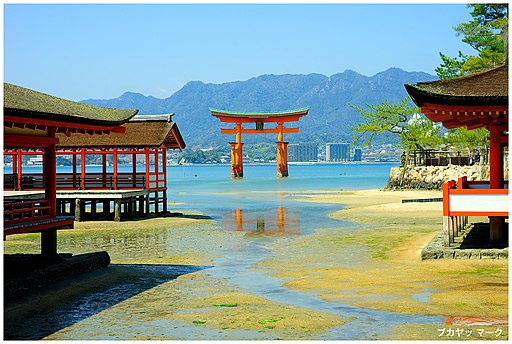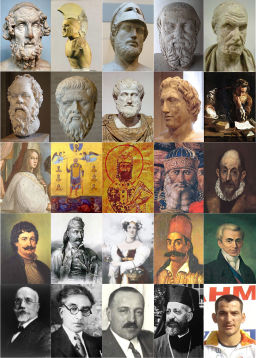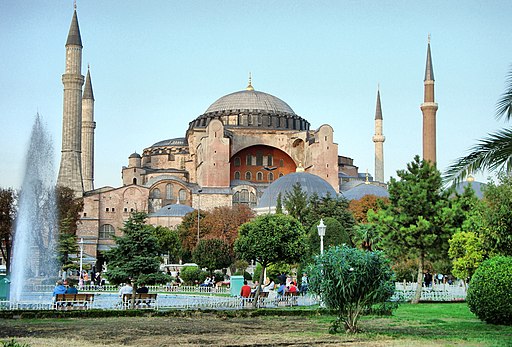
“Isabella” by John Everett Millais depicts a scene in the relationship between Isabella, the sister of wealthy merchants, and their poor apprentice Lorenzo.
It shows the moment at which Isabella’s jealous brothers realize that there is a romance between the two young people. The brothers later plot to murder Lorenzo so they can marry Isabella to a wealthy nobleman.
The painting illustrates an episode from a 1300s story which was reprised by John Keats in poem form.
In the painting, Isabella is being handed a blood orange on a plate by the doomed Lorenzo, signifying the later spilling of Lorenzo’s blood.
One of her brothers kicks a frightened dog while cracking a nut and leaning forward in an upturned chair. The painting is structured with a deliberately distorted perspective, elongating the right-hand side of the table.
This artwork was Millais’s first work in the Pre-Raphaelite style, created shortly after the formation of the Pre-Raphaelite Brotherhood in 1848.
The base of the bench on which Isabella sits has a carving depicting a kneeling figure under which appear the letters PRB which stand for Pre-Raphaelite Brotherhood. This painting was the first to incorporate the Pre-Raphaelite initials.
A distinctive Pre-Raphaelite feature is the hidden symbolism in their paintings. Experts claim several hidden phallic symbols in this picture, mainly surrounding the frustrated brother on the front left.
Critics argue that the critical symbol is the shadow on the table near his crotch area, below his elbow and the related body language.
John Everett Millais
The artist, Sir John Everett Millais, was a Victorian-era English painter who was one of the founders of the Pre-Raphaelite Brotherhood. The Pre-Raphaelite Brotherhood was founded at his home in London.
Millais became a famous exponent of the style with this painting. By the mid-1850s, Millais was moving away from the Pre-Raphaelite style. He had developed a new and powerful form of realism in his art.
Pre-Raphaelites
The Pre-Raphaelites was a group of English painters, poets, and art critics, founded in 1848. The group intended to reform art by rejecting what it considered the mechanistic approach first adopted by the artists who succeeded Raphael and Michelangelo, hence the name “Pre-Raphaelite.”
The Pre-Raphaelite Brotherhood sought a return to the abundant detail, intense colors, and complex compositions of Pre-Raphaelite Italian art.
The Pre-Raphaelites focused on painting subjects from modern life, and literature often used historical costumes for accuracy.
They painted directly from nature itself, as accurately as possible, and with intense attention to detail.
The Pre-Raphaelites defined themselves as a reform movement, created a distinct name for their art, and published a periodical to promote their ideas.
A later, medieval influence extended the movement’s power into the twentieth century with artists such as John William Waterhouse.
Lorenzo and Isabella
- Title: Isabella (also known as Lorenzo and Isabella)
- Artist: John Everett Millais
- Date: 1849
- Medium: Oil on Canvas
- Style: Pre-Raphaelite
- Dimensions: 103 cm x 142.8 cm; frame: 136.5 cm x 177.5 cm
- Museum: Walker Art Gallery
John Everett Millais
- Name: Sir John Everett Millais, 1st Baronet
- Born: 1829 – Southampton, England
- Died: 1896 (aged 67) – Kensington, London
- Nationality English
- Notable works:
- Isabella
- Christ in the House of His Parents
- The Martyr of Solway
- Ophelia
- Blow Blow Thou Wind
- The Black Brunswicker
- A Dream of the Past: Sir Isumbras at the Ford
Virtual Tour of Pre-Raphaelite Artists
John Everett Millais
- Isabella
- Christ in the House of His Parents
- The Martyr of Solway
- Ophelia
- Blow Blow Thou Wind
- The Black Brunswicker
- A Dream of the Past: Sir Isumbras at the Ford
William Holman Hunt
- Christ in the House of His Parents
- Our English Coasts
Dante Gabriel Rossetti
- Lady Lilith
- Dante’s Dream
- Dante Gabriel Rossetti – Self Portrait
- The Beloved
- Bocca Baciata
John William Waterhouse
- The Lady of Shalott
- The Favorites of the Emperor Honorius
- Circe Invidiosa
- Diogenes
- I Am Half-Sick of Shadows, Said the Lady of Shalott
- Hylas and the Nymphs
- Echo and Narcissus
- Ulysses and the Sirens
- Consulting the Oracle
- A Tale from the Decameron
- Circe Offering the Cup to Ulysses
- Saint Eulalia
Marie Spartali Stillman
- Love’s Messenger
Ford Madox Brown
- The Star of Bethlehem
- King Cophetua and the Beggar Maid
Henry Holiday
- Dante and Beatrice
Edward Burne-Jones
- The Star of Bethlehem
- King Cophetua and the Beggar Maid
A Tour of the Walker Art Gallery
- “Isabella” by John Everett Millais
- “The Martyr of Solway” by John Everett Millais
- “Perseus and Andromeda” by Frederic Leighton
- Elaine by Sophie Gengembre Anderson
- “Echo and Narcissus” by John William Waterhouse
- Fantine by Margaret Bernadine Hall
- “The Hunted Slaves” by Richard Ansdell
- “Dante’s Dream” by Dante Gabriel Rossetti
- “Dante and Beatrice” by Henry Holiday
- “The Death of Nelson” by Benjamin West
- Masterpieces of the Walker Art Gallery
Pre-Raphaelites: John Everett Millais – Isabella
Isabella – John Everett Millais
John Everett Millais. ISABELLA 1848-9. Walker Art Gallery, Liverpool, UK
~~~
“Art is not a study of positive reality; it is the seeking for ideal truth.”
– John Ruskin
~~~
Photo Credit: John Everett Millais [Public domain], via Wikimedia Commons
Popular this Week








 Sponsor your Favorite Page
Sponsor your Favorite Page SEARCH Search for: Search Follow UsJoin – The JOM Membership Program
Sponsor a Masterpiece with YOUR NAME CHOICE for $5
Share this:
- Tweet
